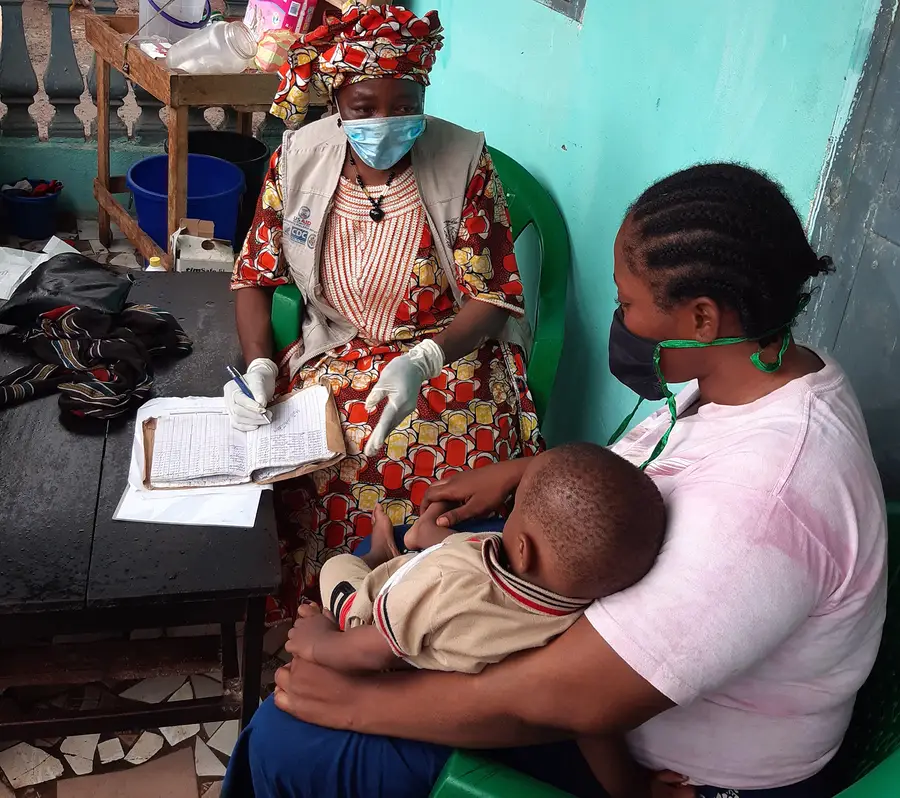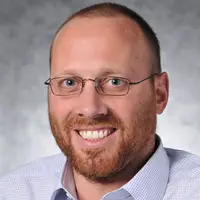
A community health worker performs a malaria rapid diagnostic test (RDT) on a child during a home visit in Guinea, while wearing a mask to adhere to COVID-19 safety guidelines. Photo from USAID StopPalu+ project
As COVID-19 spread rapidly across the globe at the beginning of this year, our global health project teams had to quickly pivot their approaches to project management and implementation. Whether working in health systems strengthening, malaria, family planning and reproductive health, or neglected tropical diseases (NTDs), each team faced unique challenges and disruptions to programming resulting from the pandemic. Some teams had to completely pause field activities, while others navigated how to continue safely providing life-saving services during a pandemic.
Soon after the start of the pandemic, nine of our in-country project directors, or Chiefs of Party (COP), rallied together to participate in weekly virtual meetings, where they shared their stories and lessons learned with one another. We found that while each country context was different, there were many similarities across countries, and as the calls continued, it was clear that they would be an important platform for identifying common challenges, sharing adaptations, and mutually generating solutions. Here are a few things that our COPs are focusing on as they work to adapt to the ever-evolving context of COVID-19:
1. Finding flexible and creative ways to adapt to the challenges of remote work.
Remote work poses unique challenges for our global health projects, which rely on in-person interactions in health facilities and communities to build capacity and provide critical care that can save lives. Our teams have been thinking through creative ways to continue sharing information and reaching communities in need with essential services.
Laurentiu Stan, COP for the USAID ReachHealth project, which works to improve maternal, child and adolescent health in the Philippines, shared how ReachHealth pivoted from in-person data collection to using rapid phone surveys to collect time-critical data on family planning services. This approach to data collection could be valuable beyond COVID-19 as it saves time and resources. The project is also engaging with non-health actors to incorporate family planning information and commodities into food packs that are distributed to communities.
In Tanzania, the USAID Okoa Maisha Dhibiti Malaria (OMDM) project, led by Ssanyu Nyinondi, has been coordinating data review meetings every two weeks via Zoom with the Zanzibar Malaria Elimination Program (ZAMEP), Tanzania National Malaria Control Program (NMCP), and local stakeholders. This has helped bring the malaria programs and their partners together during COVID-19 to virtually discuss progress and key action items that support malaria control and elimination efforts throughout Tanzania and Zanzibar.
In Ethiopia, Sharone Backers, COP for the USAID Act to End NTDs | East project shared that when office files needed to be shared physically, the team devised innovations such as “garden drop-offs” where a team member would drop off material in a colleague’s garden or backyard, notify the recipient and leave to ensure that proper social distancing protocols were observed, all while making sure a friendly wave was exchanged from a distance.
2. Collaborating and communicating closely with local partners to respond to disruptions.
During this time of crisis, collaboration, engagement, and buy-in from all stakeholders are critical to ensure successful adaptations to COVID-19. Ben Binagwa, COP for USAID Act to End NTDs | East in Uganda, shared that when Uganda started lifting its partial lockdown in June, there was a need for guidance on how to safely restart NTD program activities that had been paused due to the pandemic. The project is collaborating with the Ugandan Ministry of Health as well as other NTD stakeholders to establish Standard Operating Procedures, which will provide concrete guidance for restarting NTD activities in Uganda.
Experiences with prior infectious disease outbreaks or other stressors has also strengthened the ability of countries and project teams to adapt and respond to the pandemic. For example, Guinea is leveraging a coordinating mechanism established during the Ebola epidemic of 2014-2016 to manage the COVID-19 response. Aissata Fofana, COP of the USAID StopPalu+ project shared that StopPalu+ is closely collaborating with Guinea’s National Malarial Control Program and other stakeholders including government, program implementers, donors, and community health workers through this mechanism to develop guidance on how to safely continue life-saving malaria activities during COVID-19.
The Democratic Republic of Congo has similarly experienced recurring public health challenges and civil unrest in the past, which Raymond Stewart, COP of USAID Act to End NTDs | East believes has prepared project staff to adapt to COVID-19 stressors. Dharmpal Raman, COP of USAID Act to End NTDs | East in Nepal also shared that due to frequent experience of disruptions caused by natural disasters, his team has had an easier time using technology platforms to communicate.
3. Creating transparent and frequent feedback loops that build stronger, more resilient teams.
“Work is what we do, not where we go.” This quote from Ben Nwobi, COP for USAID Act to End NTDs | East in Nigeria, perfectly encapsulates the resilient nature of our teams. Many of our COPs reported that although they have faced challenges not being able to interact in person, they have been able to lean in on new communications technologies and double down on their people by checking in more frequently than before the pandemic. The availability of online engagement platforms such as WhatsApp and Zoom has broken down geographical barriers and allowed for more frequent touchpoints. Jui Shah, COP for the USAID Inform Asia project in Thailand and Laos, shared that her team in many ways feels more connected since working from home because online interactions have allowed them to connect on a more personal level. An isolating situation has brought our teams closer in a unique way, and this continued level of communication and teamwork are a recipe for resilience to future change and uncertainty.
COVID-19 has in many ways brought us together as a global health community and called us to be strong leaders, communicators, and collaborators as we all face a common threat to the health and wellbeing of humanity. These weekly virtual meetings began as a natural response to a crisis, but we believe that they hold value beyond COVID-19 and position us to be more collaborative and stronger in the face of any new challenges that the future might hold in store. In these troubled times, these learnings and adaptations are perhaps a reassuring reminder to us of the old adage that we are stronger together and that after darkness, comes light.


